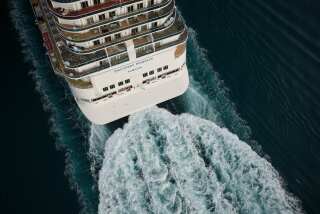New wearable medallions get Carnival’s passengers what they want, when they want it
- Share via
MIAMI Whether it’s the first roller coaster at sea, a new celebrity chef or Broadway show, cruise companies are forever one-upping each other in the amenities race. But their latest draw is largely invisible.
As tech becomes more and more intertwined in people’s routines, cruise lines are racing to give travelers the same frictionless convenience that tech gives them on land.
Companies including Royal Caribbean Cruises, Ltd., Norwegian Cruises and MSC have already introduced some onboard tech conveniences and expect to launch more in the coming months. But one of the most highly touted efforts, by Carnival Corp., is already live.
Speaking at the 2017 Consumer Electronics Show in Las Vegas, Carnival CEO Arnold Donald called the Medallion as a “real game changer.” After years in development, Carnival Corporation debuted its Ocean Medallion technology on a Princess Cruises ship late last year. It is the first company to create an overall system that supports purchases, ship-board navigation, on-demand food-and-beverage delivery, mobile gambling and gaming, free texting and cabin access though six smart phone apps are required to operate all.
The Medallion most familiar from guests’ everyday lives are its shipboard navigation and food ordering. Used in conjunction with the smart phone apps, the system saves time for passengers and crew.
The medallion itself is a quarter-sized piece of metal that passengers can use to make onboard purchases, open their cabin doors, check in at safety drills and leave and re-board the ship in port. Most passengers wear the Medallion inside a free metal case at the end of a neck lanyard (Bracelets and necklaces are on sale on board for up to $60).
To lead the project, Donald hired the developer of the Disney theme park’s Magic Band and FastPass, John Padgett. Since he joined Carnival in 2014, Padgett and his team have worked from a Doral innovation center to develop the concept, then created the software and hardware required to bring the new tech to life. That includes thousands of sensors installed aboard its Medallion-class Princess Cruises ships, Caribbean Princess and Regal Princess, and later this year, Royal Princess, Crown Princess, and Sky Princess.
The effort proved more complicated than the team originally estimated. Although passenger launch was originally targeted for November 2017, the Ocean Medallion technology didn’t fully roll out until late last year. “It’s 4,000 sensors, TVs, doors, 1,000 crew trained,” Padgett said. “It took us about four years.”
The Ocean Medallion system is designed to let passengers use it as much or as little as they wish; those who opt out continue using hotel-key-like cruise cards to access their cabins and pay for food and drink. Those who opt in can choose to get their medallion in advance through the mail or pick it up at the port.
We sailed on a recent Caribbean Princess cruise to test Ocean Medallion and talk with passengers about it.
On our sailing, all 3,000-plus passengers opted in to the Ocean Medallion system. But how each used the system varied.
Before the start of the cruise, hundreds used the OceanReady app at home to upload photos of their faces and passports. At Port Everglades, those passengers were able to by-pass check-in desks; instead, they simply tapped the medallion to a sensor, presented their passports and went directly onto the ship.
The medallion also sped up the check-in process at muster stations during the safety practice, shaving around 15 minutes off the drill.
The feature many passengers said they liked best was the automatic cabin access. A sensor installed next to each stateroom door detects when the right medallion is near and unlocks. Passengers also gave high marks to the way it functions at the bar, where servers simply tap the disc to a sensor in exchange for a drink, with no receipt required.
The medallion also eliminates in-cabin interruptions for guests and saves time for housekeeping crew. Previously, housekeepers knocked on doors or devised signals such as a bit of paper pushed into the door jam that falls to the ground when guests leave. Now, each housekeeper has a smart phone with an app that shows them which rooms are occupied.
Elmer Cervantes, a stateroom steward from the Philippines who has been working on Princess ships for 14 years, has 19 cabins to clean twice a day. “With this, my stress level goes down, and I find it easier,” he said. “I’m more organized to do my job.”
Even without the internet, passengers can use the apps by connecting to the ship’s free onboard wifi network dubbed MedallionNet.
With the OceanNow app, passengers can order a drink or a meal from wherever they are on the ship. Even if the passenger moves, the crew member finds them by tracking their medallion. In the future, Padgett said passengers also will be able to request a massage at their deck chair or other location. OceanCompass is a way-finding app that works similar to GoogleMaps: it knows where your medallion is and where you’re going, and it shows you the best route. It also lets you locate your travel buddies dubbed Shipmates and chat with them via the app.
The OceanView app streams Carnival’s branded TV shows. PlayOcean features nautical themed games and allows passengers to design their “tagalong,” a tamagotchi-esque digital companion that shows up on the ship’s screens when a corresponding medallion is near. OceanCasino allows passengers to gamble from anywhere on the ship and practice at home. For passengers who don’t want to carry around their phones, the apps can be used on screens throughout the ship.
During a medallion how-to class before the ship left Fort Lauderdale, passengers listened to a series of commercial-like videos explaining how each app could enhance their vacations. But despite the benefits speed, service and way-finding some passengers decided to forgo the extra technology
Carolyn Jordan, 77, of Nashville, Tenn., said, “We were dragged kicking and screaming into technology that we’ve never needed,” pointing at her cellphone. “It defeats the purpose if we order the drink, you may miss the opportunity to run into someone. You miss that connectivity.”
Cheryl Mooney, 73, from St. Louis, estimated that half of the passengers her age had given up trying to understand the tech after just one day at sea. Her husband Bob, 77, complained about the location of the Ocean Medallion help desk, which is in a crowded corridor. “Poor rollout,” he said.
On this February sailing, many guests were retirees who may not be natural targets for new tech. But even tech-savvy, first-time cruiser Valerie Bashiri, 39, from the Minneapolis area, said she didn’t like having to download six different apps.
“That’s not very user friendly,” she said. “It’s working how I would expect something new to work. It’s not functioning at its peak.”
One feature Bashiri said she’d like to see: a digital calendar where she could browse and book excursions from her phone. That exact function is coming soon to the OceanNow app. Then, passengers will be able to scan the schedule (already available on interactive screens throughout the ship) up to six months before the cruise and bookmark activities they’d like to attend.
Carnival didn’t expect OceanMedallion to be an instant hit with every guest. CEO Donald said some passengers weren’t yet familiar yet with all of the platform’s features.
“If it resonates with guests and guests really want it, and we see ticket revenue, on board revenues, costs, happier crew, happier guests ... we’ll keep it,” he said. “But if for some reason, whatever reason it doesn’t work out that way, John (Padgett) is busy innovating lots of other stuff, and we will do something else.”
It remains unclear if onboard tech will become a real selling point for cruise ships, but other lines are busy rolling out similar platforms of their own.
Last year Norwegian Cruise Line announced a partnership with Orlando-based DeCurtis Corporation, a hospitality software company, to develop its onboard tech system. And just last month the line announced that its app allowing passengers to view activity schedules and make excursion reservations is now available fleet-wide.
In 2017, MSC Cruises launched its smart-band technology, which allows passengers to locate each other and find their way around the ships using their mobile devices. MSC debuted the first artificial intelligence assistant at sea, ZOE, this month on its new MSC Bellissima ship.
Royal Caribbean’s mobile app allows passengers to check in at the port, book onboard and excursion activities, unlock their cabins and see maps of the ship. On select ships, passengers can also use the app to control their cabins’ air conditioning, heating, blinds and TV. Like the Medallion apps, Royal Caribbean’s can be used without purchasing internet. In May, Royal Caribbean plans to roll out its own on-demand service allowing guests to order food and drinks to their exact location; it also is working on a luggage-tracking feature.
All of the new tech is still catching on with passengers, but Padgett at Carnival said no matter at what level the passengers engage with it, they are benefiting.
“We are maximizing everything you love, and taking away everything you didn’t,” he said. “Connectivity was a sacrifice when you went on a cruise. Now it’s not.”
(c)2019 Miami Herald
Visit Miami Herald at www.miamiherald.com
Distributed by Tribune Content Agency, LLC.
More to Read
Sign up for The Wild
We’ll help you find the best places to hike, bike and run, as well as the perfect silent spots for meditation and yoga.
You may occasionally receive promotional content from the Los Angeles Times.






